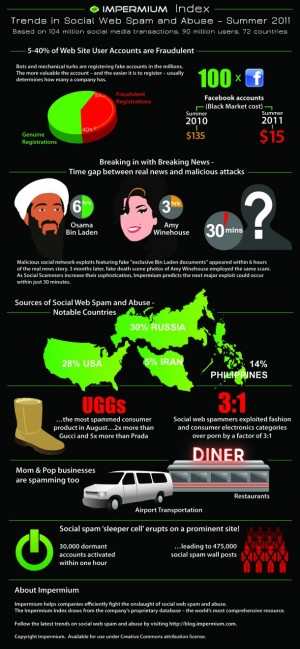What if all your Facebook friends were fakes? [Infographic]
As the debate over whether or not Google+ should allow fake names continues, I've got a good reason why real names are better: Security.
Today, security start-up Impermium released some startling statistics about scammers and spammers creating fraudulent accounts on social websites. There's a good chance that new Facebook friend is your worst enemy. Lonely hearts, beware! Impermium found that as many as 40 percent of users on some services are fraudulent accounts.
"Scammers are registering accounts by the millions as they perpetrate fake 'friend requests', deceptive tweets, and the like, while the black market for bulk social networking accounts is growing exponentially," according to Impermium.
Impremium describes one "coordinated attack by more than 30,000 fraudulent accounts, which lit up in a single hour and attempted to submit more than 475,000 malicious wall posts". Well, guessing which social network probably isn't difficult when referring to "wall posts".
Days gone by (well, in Internet time), people had to hang around bad Net neighborhoods like porn sites to get drive-by malware or even scammed. Cybercriminals have gone mainstream. Hey, it's a volume business, and surely there's more people in safe Net neighborhoods. According to Impermium: "The top consumer categories for social web spam were fashion and electronics, which outperformed porno scams by 3x".
Top-exploited brand in August surprised me: UGGs.
The security start-up tracked 104 million social media transactions over 100 days to compile the data.
Circling back to my opening sentence. Google has had enough trouble with spammers exploiting Blogger as part of their campaigns. The Google Profile approach, where real names is attached to services like G+, is sensible security.

